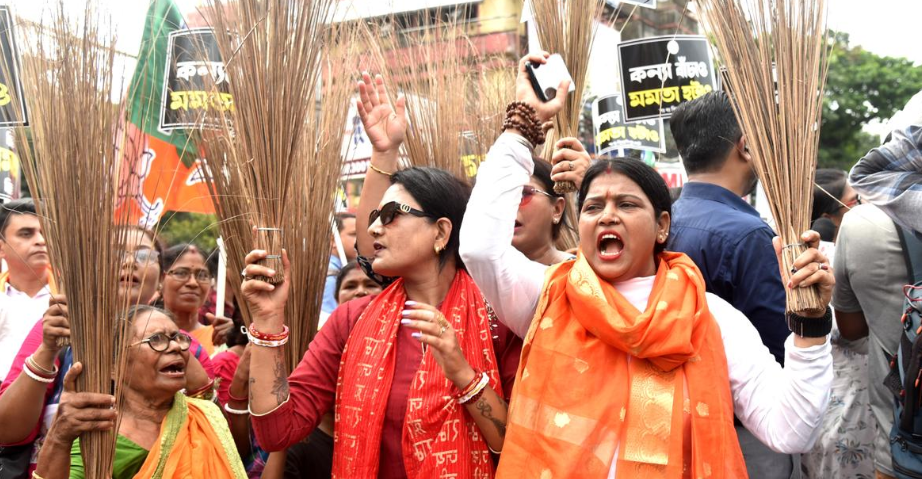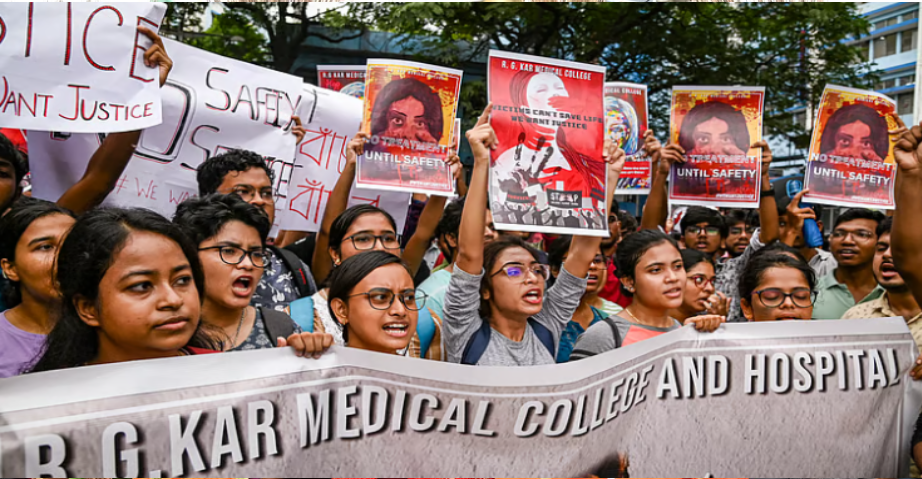On June 25, 2025, the city of Kolkata was rocked by the alleged gang-rape of a 24-year-old law student within the premises of the South Calcutta Law College. The incident, which reportedly occurred in the college’s guard room, quickly drew widespread condemnation and ignited a fresh wave of protests across West Bengal. The primary accused, Monojit ‘Mango’ Mishra, a former student and contractual employee known for his political influence on campus, was arrested along with two current students, Pramit Mukherjee and Zaib Ahmed, and a college guard, Pinaki Banerjee.
Initial reports from the Kolkata Police indicated that a First Information Report (FIR) was filed under charges of gang rape and wrongful confinement. The investigation, initially handled by a nine-member Special Investigation Team (SIT), was subsequently transferred to the Detective Department of the Kolkata Police. This transfer came with the addition of more stringent sections to the case, including kidnapping, causing grievous hurt with a dangerous weapon, and criminal intimidation.
Kolkata Commissioner of Police Manoj Kumar Verma stated that a “lot of evidence had been collected and is currently being analysed”. Further details emerging from the police investigation revealed a disturbing narrative. According to sources within the Kolkata Police, Monojit Mishra allegedly believed that the threat of circulating a video of the sexual assault would deter the victim from reporting the crime. It was also reported that Pramit and Zaib were involved in filming the assault. Police sources indicated that Monojit had instructed friends to monitor the Kasba Police Station, located about a kilometer from the college, to ascertain if the survivor had filed a complaint.
In a particularly chilling revelation, police informed the Alipore court that the accused had prolonged the victim’s torture by purchasing an inhaler to keep her conscious, demonstrating a calculated intent to extend the ordeal. The medical report of the survivor also found signs of forcible sexual intercourse and an abrasion mark on her neck, further corroborating the assault. Police have confirmed that Monojit Mishra has a history of 11 past cases, many involving harassment and misbehavior with women, and was out on bail at the time of this incident.
The South Calcutta Law College rape case has triggered significant public outrage and political unrest. Various political parties and student organizations have staged protests across Kolkata, demanding swift justice for the victim and raising serious questions about the safety of educational institutions in the state. The Bharatiya Janata Party (BJP) carried out protest marches, with leaders like Mr. Adhikari stating, “The South Calcutta Law College today is West Bengal’s shame because of Mamata Banerjee… Medical colleges are not safe. Law colleges are not safe”. The Students Federation of India also held protest rallies.
The case has been further complicated by controversial claims made by the accused’s lawyer. Notably, the lawyer asserted that scratch marks found on Monojit Mishra’s body were ‘love bites’ and not indicative of resistance from the victim. This claim has been widely condemned as an attempt to victim-blame and trivialize the severity of the crime. The Calcutta High Court has intervened, directing the West Bengal government to submit a progress report on the investigation, underscoring the judicial scrutiny the case is under.

The 2024 R. G. Kar Medical College and Hospital Rape and Murder Case
Less than a year prior, on August 9, 2024, Kolkata was gripped by another horrific incident: the rape and murder of a 31-year-old female postgraduate trainee doctor at the R. G. Kar Medical College and Hospital. Her body was discovered in a seminar room within the college premises, leading to immediate shock and widespread protests. The subsequent arrest of Sanjoy Roy, a 33-year-old civic volunteer working for the Kolkata Police, on August 10, 2024, as the primary suspect, further intensified public scrutiny.
The victim had completed a gruelling 36-hour shift and had dinner with colleagues on the night of August 8, 2024, before retiring to a seminar hall. Her body was found the following morning, around 9:30 AM, in a semi-nude state with severe injuries to her eyes, mouth, and genitals, indicating a brutal assault. Initially, college authorities reportedly informed her family that she had committed suicide, a claim that was quickly disputed by the family and later disproven by the autopsy conducted on August 9, which confirmed an unnatural death.
The investigation into the R. G. Kar case faced significant challenges and public distrust. Three days after Roy’s arrest, the Calcutta High Court took the extraordinary step of transferring the investigation to the Central Bureau of Investigation (CBI). This decision was a direct response to the widespread lack of confidence in the Kolkata Police’s handling of the case, with many, including the junior doctors, expressing concerns about the impartiality and thoroughness of the local probe. The CBI’s chargesheet later detailed how Sanjoy Roy was identified and apprehended, based on call records and other forensic evidence.
The R. G. Kar case also sparked massive protests across India, particularly among medical professionals and women’s rights activists. Doctors across the country went on strike, demanding justice for their colleague and better safety measures in hospitals. The Supreme Court of India also weighed in, terming the case “horrific” and expressing concerns over the safety of female doctors in hospitals. The court’s intervention underscored the national significance of the case and the systemic issues it brought to light regarding the security of healthcare workers and the effectiveness of law enforcement in handling such sensitive matters. Sanjoy Roy was eventually convicted and sentenced to life imprisonment in January 2025.
Shocking similarities between the two cases
The 2025 South Calcutta Law College rape case and the 2024 R. G. Kar Medical College and Hospital rape and murder case, while distinct incidents, reveal a troubling pattern of vulnerabilities within institutional settings and highlight systemic failures in ensuring safety and delivering justice. The similarities between these two high-profile cases are stark and demand critical examination:

Institutional Settings as Crime Scenes: Both horrific incidents occurred within the confines of educational or medical institutions. The South Calcutta Law College incident took place in a guard room on campus, while the R. G. Kar case unfolded in a seminar room within the medical college. This commonality raises profound questions about the security protocols and overall safety of individuals within spaces that are traditionally considered safe havens for learning and healing. It underscores a disturbing reality where places of education and care can become sites of extreme violence.
Perpetrators with Institutional Connections: A deeply unsettling aspect shared by both cases is the involvement of individuals with direct ties to the institutions. In the R. G. Kar case, the convicted perpetrator, Sanjoy Roy, was a civic volunteer associated with the Kolkata Police, a position that implies a degree of trust and authority within the hospital environment. Similarly, Monojit Mishra, the prime accused in the South Calcutta Law College case, was a former student and contractual employee who wielded significant political influence on campus. This pattern suggests a dangerous abuse of power and access, where individuals entrusted with or familiar with institutional environments exploit their positions to commit heinous crimes.
Widespread Public Outcry and Demands for Justice: Both incidents triggered immediate and widespread public outrage, leading to massive protests and demonstrations across Kolkata and other parts of India. The sheer scale of public reaction, particularly from student bodies, medical fraternities, and women’s rights organizations, underscores a collective societal demand for justice and accountability. This sustained public pressure played a crucial role in pushing for more rigorous investigations and judicial interventions in both cases.
Scrutiny and Distrust of Initial Police Investigations: A critical and recurring theme in both cases was the public and judicial skepticism surrounding the initial police investigations. In the R. G. Kar case, the Calcutta High Court’s decision to transfer the investigation to the CBI was a direct consequence of the perceived inadequacies and lack of transparency in the local police’s handling of the case. Similarly, in the South Calcutta Law College case, the investigation was moved from an SIT to the Detective Department, and controversial statements from the accused’s lawyer further fueled concerns about the integrity of the investigative process. This highlights a persistent challenge in maintaining public trust in law enforcement agencies when dealing with sensitive cases of sexual violence.
Attempts at Victim Blaming and Discrediting: A particularly disturbing similarity is the apparent attempts to undermine the victims’ credibility or trivialize the assaults. In the R. G. Kar case, the initial suggestion by college authorities that the victim had committed suicide, despite evidence to the contrary, can be seen as an attempt to deflect responsibility and control the narrative. More overtly, in the South Calcutta Law College case, Monojit Mishra’s lawyer’s claim that scratch marks on his body were ‘love bites’ rather than signs of resistance is a blatant example of victim-blaming and an attempt to trivialize the sexual assault. This insidious tactic, unfortunately, is a common thread in many sexual violence cases, aiming to shift focus away from the perpetrator’s actions and onto the victim.



